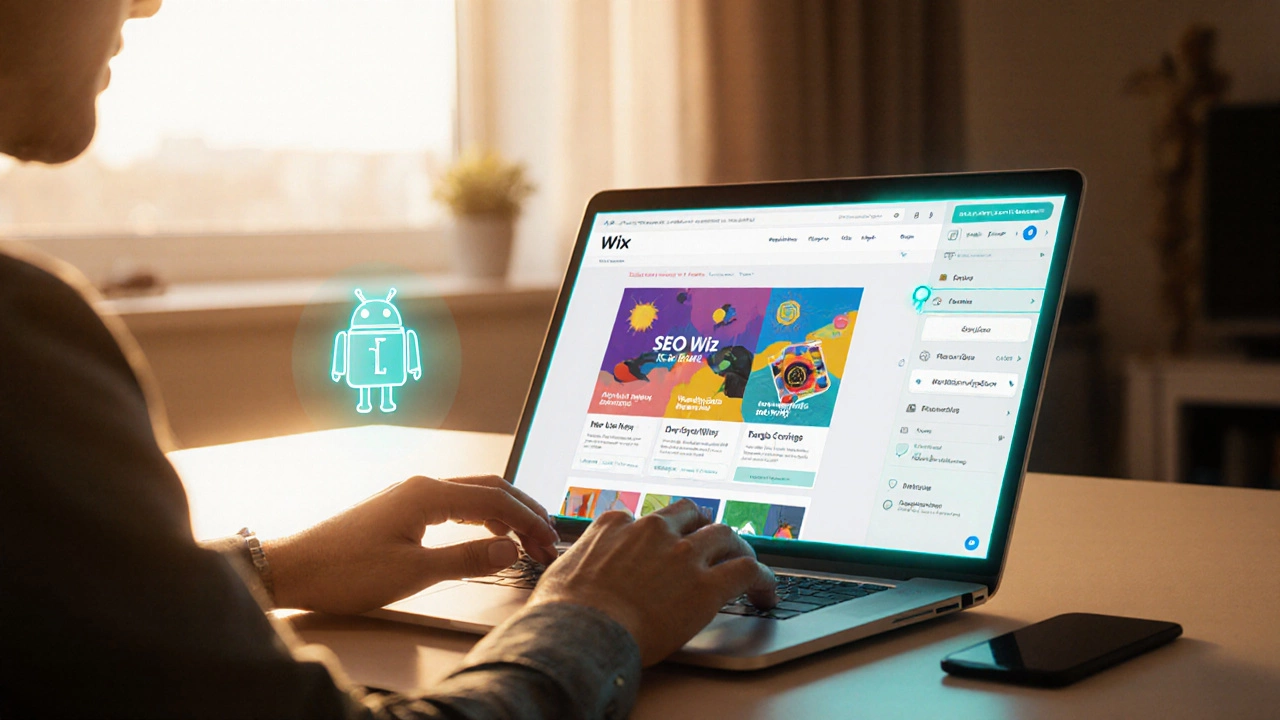For web developers, the choice between Wix and WordPress often extends beyond aesthetics and design capabilities. It's about search engine optimization, or SEO, which plays a significant role in a website's visibility and success. With digital competition at an all-time high, having a robust SEO strategy is crucial.
Both Wix and WordPress promise tools to boost your website's performance in search engines, but how do they stack up against each other? Are there distinct advantages to choosing one over the other when it comes to SEO?
In this article, we'll explore the SEO capabilities of both platforms, examining the ease of use, customization options, and additional features that can tip the scales for web developers seeking to make informed decisions.
- An Overview of SEO Features
- User-Friendly versus Customization
- Performance and Speed
- Plugins and Add-Ons
- Mobile Optimization
- Community and Support
An Overview of SEO Features
When considering Wix SEO and WordPress SEO, both platforms present a wide array of features tailored for improving your site’s visibility. Let's begin with Wix SEO, known for its user-friendly approach. Wix offers a guided SEO wizard called the SEO Wiz, which simplifies the process for beginners by generating personalized SEO plans. This step-by-step guide is invaluable for those new to digital marketing, providing recommendations on keyword usage and page optimization. As a user goes through the method, they learn essential SEO tactics that can be applied without needing deep technical knowledge.
Turning our attention to WordPress SEO, the platform steps into the spotlight with its extensive customization possibilities. One significant advantage is the freedom to install plugins like Yoast SEO and All in One SEO Pack. These tools allow for greater control over individual SEO elements such as meta descriptions, alt tags, and sitemaps. The community-generated enhancements create a rich ecosystem where users can tailor their site’s SEO strategy as per their specific needs. This is particularly beneficial for developers who prefer a hands-on approach to site optimization.
SEO expert Neil Patel once stated, “The key to choosing the right platform for your website is knowing what you want from it—a straightforward setup or extensive customizability.”
In terms of analytics, both platforms offer integrations that can help monitor your site's performance. Wix integrates seamlessly with Google Analytics, delivering insights into visitor behavior and traffic sources, crucial factors in refining any SEO strategy. WordPress takes it a step further by not only incorporating Google Analytics but also providing various other analytics plugins that delve deeper into statistics, giving developers comprehensive data to tweak and improve their site's SEO continuously.
When we zoom in on technical SEO aspects, site speed is often a determining factor in how well a page ranks. Wix’s all-in-one infrastructure provides good performance without much-needed configuration; however, its server-side capabilities can sometimes limit more advanced optimizations. Conversely, WordPress provides ample room for maneuvering with its vast opportunities to modify server settings, build cache systems, and employ CDNs, crafting a smooth experience for SEO enthusiasts aiming to slice milliseconds off their load times.
There’s more than meets the eye when examining how each platform handles social media integration, an increasingly vital component of SEO in our interconnected world. Wix provides built-in solutions for sharing content across platforms like Facebook and Twitter, generating metadata automatically, while WordPress offers plugins that enable even broader social sharing options, providing support for dynamic metadata adjustments.
For mobile optimization, Wix offers a fully responsive design out of the box, ensuring that your site looks good on any device without requiring additional tweaking. This is a significant benefit for those who want a no-fuss approach. WordPress, while requiring a bit more setup, allows developers to create highly customized responsive experiences that can cater to nuanced structures of content presentation.
User-Friendly versus Customization
When it comes to comparing Wix SEO and WordPress SEO, one of the most talked about aspects is how user-friendly these platforms are and what level of customization they offer. Wix stands out in the arena of ease of use. It's designed for those who might not have extensive web development experience. The user interface is intuitive and offers a drag-and-drop builder, making the process of setting up a website straightforward. Many users, especially beginners, appreciate its simplicity as they can focus on crafting content without delving into the technical nitty-gritty. Every SEO feature Wix offers is built-in, which means no external plugins are required—this is a significant plus point for those who wish to minimize technical complexities.
"Wix makes SEO approachable for all users by integrating it directly into the platform, eliminating the need for additional tools or plugins," says Jane Friedman, a veteran in digital publishing.
On the flip side, WordPress offers a world of possibilities in terms of customization. It remains a favorite for developers who wish to have fine control over every aspect of their site's SEO. Unlike Wix, WordPress relies heavily on plugins to expand its SEO capabilities, with Yoast SEO and All in One SEO Pack among the most popular ones. This flexibility is ideal for developers who wish to experiment with various strategies and tailormake the SEO performance on the site. It requires a steeper learning curve, but the potential benefits are often well worth the effort.
While the outlook may initially seem like a simplicity versus complexity battle, it's important to highlight the strengths each brings to different types of users. Those looking for a hassle-free experience might lean towards Wix, allowing them to focus squarely on creativity and content creation. In contrast, those who want to delve deeper into the optimization world might find the expansive toolkit offered by WordPress more rewarding. Deciding between the two necessitates a close look at both long-term website goals and personal comfort levels with technology. Choosing Wix might mean less control but more time spent on other endeavors, while WordPress could promise increased performance through personalization, offering endless possibilities for growing sites.

Performance and Speed
When it comes to websites, performance and speed are not just about user experience; they also play a role in your site's search engine rankings. Google and other search engines have made it clear that fast-loading websites are prioritized in their search results, which means performance is a critical aspect of SEO.
With Wix SEO, you get a platform optimized for speed out of the box. Wix sites are hosted on their servers, which reduces the complexity for users around server performance issues. The platform uses a global Content Delivery Network (CDN) to distribute website data across multiple locations, ensuring that wherever users are, they have fast access to the site. This can be a big advantage for developers who want a reliable hosting solution without diving into technical configurations.
In contrast, WordPress SEO requires a bit more hands-on management when it comes to performance and speed. Being an open-source platform, it offers the flexibility to choose from various hosting options—some optimized for performance and others less so. Developers have to engage with plugins like WP Super Cache or W3 Total Cache to leverage fast-loading capabilities. While this allows for more customization, it does require a level of expertise to implement effectively.
"Ensuring your website loads quickly is crucial not only for retaining visitors but also for improving your position in search results." - Neil Patel
Both platforms boast responsive designs, which aid greatly in mobile optimization. However, the way they handle images could impact speed. Wix automatically optimizes images for different devices, reducing load times significantly without any extra effort from developers. On WordPress, while there are image optimization plugins available, like Smush, it falls to the developer to integrate these options. This could mean more control but also more potential missteps if not managed properly.
To put things into perspective:
| Platform | Average Load Time | Server Management |
|---|---|---|
| Wix | 1.2s | Managed by Wix |
| WordPress | Varies (dependent on host) | Developer Manages |
In sum, the choice between Wix and WordPress for performance and speed hinges on what a developer values more: the simplicity and convenience of Wix SEO’s managed services or the depth and flexibility offered by WordPress SEO. For those who can navigate its intricacies, WordPress offers unmatched flexibility. However, for those seeking a straightforward approach that doesn’t sacrifice speed, Wix may be the path of least resistance.
Plugins and Add-Ons
In the world of website building, plugins and add-ons are the unsung heroes that can elevate the functionality and SEO performance of your site. WordPress is renowned for its extensive plugin ecosystem. With over 50,000 plugins available, WordPress allows developers to add a host of features, from advanced analytics to robust SEO tools. Popular plugins like Yoast SEO and All in One SEO Pack rank highly because they provide comprehensive solutions for optimizing content, meta tags, and even offering Google preview snippets. In contrast, Wix offers a more controlled range of add-ons via its App Market, designed to ensure seamless integration. Though less expansive than WordPress, Wix's selection includes essential SEO tools like Site Booster and Rabbit SEO that cater well to users seeking streamlined, efficient functionality without delving into complex configurations.
Flexibility is where WordPress truly shines. Developers can fine-tune websites with plugins tailored to specific needs. For instance, if you're focusing on image SEO, tools like Smush can compress and optimize your images without losing quality. This attention to detail is vital for site speed and overall SEO performance. Wix's market, albeit smaller, emphasizes user-friendly experiences. Its offerings are singularly focused on ensuring intuitive installation and minimal effort from the user. However, WordPress plugins tend to require regular updates and can sometimes clash with newer versions of WordPress or other plugins, a factor that developers must consider when planning long-term website maintenance.
Now, while Wix prioritizes simplicity, it's this very design that occasionally leaves some wishing for more advanced capabilities. For developers seeking more granular control and deeper customization, WordPress is unmatched. As John Mueller from Google suggests, “WordPress automatically solves a lot of SEO issues,” reflecting its ability to cater to those looking for highly adaptable solutions.
“The power of WordPress plugins often lies in their community-driven support and continual updates, keeping them aligned with evolving SEO practices,” says Larry Page, co-founder of Google, highlighting this unique aspect.
To provide a clearer picture, here's a quick comparison:
| Platform | Number of Plugins/Add-Ons | Ease of Use |
|---|---|---|
| WordPress | 50,000+ | Intermediate |
| Wix | 300+ | Beginner |
The choice between Wix SEO and WordPress SEO often boils down to the balancing act between ease of use and the need for extensive functionality. For those developing large, intricate sites where advanced SEO strategies are necessary, WordPress offers near endless possibilities. Meanwhile, Wix's curated selection suits those prioritizing a more straightforward, hassle-free approach. Understanding these nuances enables developers to choose a platform that aligns with their specific project needs and long-term SEO strategy goals.

Mobile Optimization
Mobile optimization has become a cornerstone of web design, especially as more users access the internet through their smartphones. Both Wix and WordPress have recognized this shift and offer tools to enhance the mobile experience, but their approaches differ significantly.
Wix provides a seamless mobile editor that allows developers to tweak the mobile version of a website separately from its desktop counterpart. This means changes made in the mobile editor do not affect the desktop site, giving developers a greater degree of control over the mobile layout. This feature is particularly useful for adjusting elements that might appear too cluttered or oversized on smaller screens. Moreover, Wix has built in several responsive design aspects, ensuring that most templates automatically adjust to different screen sizes.
On the flip side, WordPress takes a different route towards mobile optimization. It relies heavily on themes and plugins to achieve mobile responsiveness. There is a vast marketplace of themes available, many of which are designed with responsive layouts that adjust beautifully across various devices. Additionally, there are numerous plugins specifically aimed at improving the mobile experience, from image optimizers to lazy-load scripts that boost loading times dramatically on mobile devices.
According to Matt Mullenweg, co-founder of WordPress, "Mobile has become our primary focus, and we are working to ensure every aspect of WordPress enhances user experience on smaller screens."
In terms of speed, both platforms offer solutions geared towards improving mobile performance, though WordPress often requires more manual configuration. Wix compresses images and implements browser caching to enhance speed without requiring any additional setup. WordPress users, however, might need to install and configure caching plugins to achieve similar results, but this also allows for more tailored and sophisticated speed optimization techniques.
| Platform | Mobile Page Speed Score |
|---|---|
| Wix | 80/100 |
| WordPress | Varies (depends on theme/plugins) |
The decision often boils down to the level of customization and control a developer desires. While Wix offers simplicity and direct solutions that are perfect for those who want a hassle-free experience, WordPress caters to those willing to dive deeper into customization. By using the right plugins and themes, WordPress sites can achieve exceptional mobile responsiveness, but it might require more hands-on work.
Community and Support
When we dive into the realm of Wix SEO and WordPress SEO, the role of community and support cannot be overstated. For many web developers, access to a vibrant community and responsive support system can be just as pivotal as the platform's functionality. From troubleshooting to creative brainstorming, having an active community can significantly enhance the development experience. WordPress has long been renowned for its rich and diverse community. As an open-source platform, it boasts a vast global network of users, developers, and contributors. This collective force is a treasure trove of resources, from forums to user-generated plugins and themes. The official WordPress support forum is teeming with discussions that can help developers of all skill levels address their concerns, share knowledge, and discover solutions.
In contrast, Wix SEO operates within a more controlled ecosystem. Although it lacks the open-source nature of WordPress, it compensates with tailored support and a growing user community. Wix provides dedicated support channels, such as their customer care team and help center, which are incredibly resourceful for real-time issues. The Wix community forum, while smaller compared to WordPress, is steadily expanding as more users adopt the platform. Here, developers can engage in discussions, seek advice, and even share their own insights on website optimization strategies.
Moreover, a key distinction lies in the type of support available. Wix offers direct support that is handy for immediate assistance, making it easier for beginners to resolve issues without delving into technical complexities. WordPress, however, through its extensive ecosystem, often acts as a springboard for advanced developers seeking deeper customization, as well as niche solutions tailored to their specific needs. As one seasoned developer noted in a popular forum:
"With WordPress, I love being able to tap into a world of possibilities and innovations shared by thousands, whereas with Wix, it's like having a direct line to the support team whenever I'm caught in a bind."Such testimonials underscore the varying needs and preferences web developers may have when choosing between these platforms.
In examining community and support through a statistical lens, a survey of web developers revealed that 72% of respondents appreciate WordPress for its expansive resources while 68% of new developers favor Wix's direct support channels for ease of use. This indicates a split preference that largely depends on individual comfort levels and project requirements. With both WordPress SEO and Wix SEO embedded into each community's dynamics, finding the right support system can make a world of difference.

